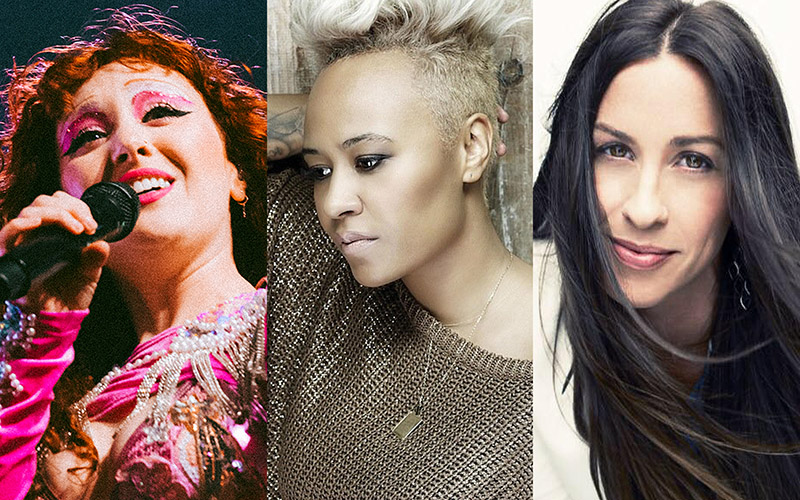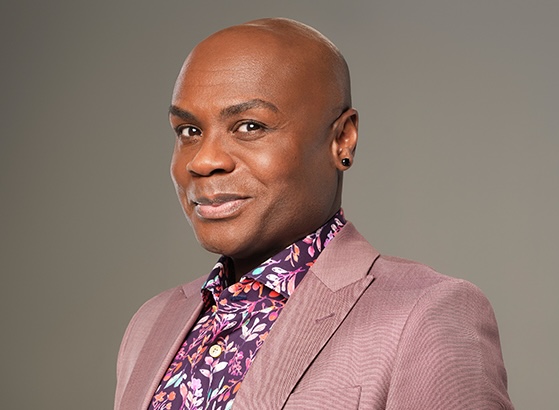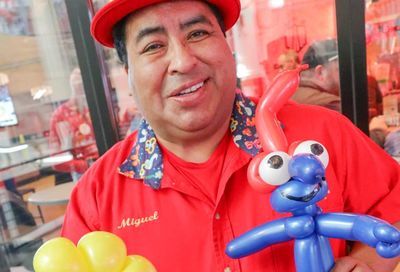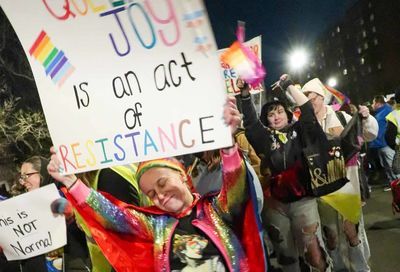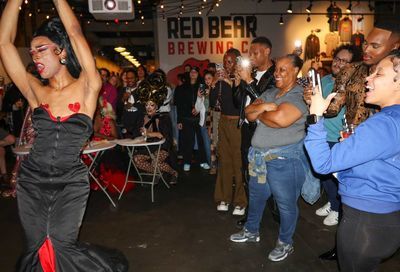Chad Allen
The MW Interview
“Long before I made the decision to come out and be an openly gay actor,” says Chad Allen, “I was told, ‘Don’t do it until it’s good news.’ I thought that was the most brilliant advice. Who I am is really good news today. I’m not afraid to share that.”
The good news didn’t end with Allen’s high-profile coming out last fall at the age of twenty-seven on the cover of The Advocate, five years after pictures of him kissing a man at a party hit the tabloid pages and set into motion a voracious rumor mill about his sexual orientation.
For the co-star of such ’80s television hits as St. Elsewhere, Our House, Webster and My Two Dads, a slew of TV movies, as well as the popular 1992-98 CBS western Dr. Quinn: Medicine Woman, that’s just where the good news starts.
 |
In a constantly evolving Hollywood culture and society-at-large, Allen happily tackles material laden with controversy, the likes of which once stifled him creatively and personally. The Chad Allen of today who produced and starred in the recent L.A. premiere of Terrence McNally’s play Corpus Christi isn’t the same Chad Allen who feared that he’d be fired from Dr. Quinn at the height of its success after tabloid-ignited rumors started flying.
The Chad Allen who will soon hit the big screen in several edgy, independent films — including a role as a junkie hustler in the just-completed Downtown — isn’t the same Chad Allen whose face was plastered across every glossy teen pin-up magazine imaginable in the ’80s. The Chad Allen who’s passionate about live theater and his involvement with emerging companies in L.A. and New York isn’t the same Chad Allen whose energies were drained by struggles with drug and alcohol abuse in his early twenties.
No, the Chad Allen who will speak at this weekend’s Youth Pride Day is a different person, indeed, eager to continue on the path that’s made him happier than ever before, and to inspire others along the way.
MW: Have you spoken at events like Youth Pride Day before?
CHAD ALLEN: I’ve never participated in a youth pride festival in my life.
MW: What about other general gay pride events?
ALLEN: I’ve never been to one as a speaker, but I’ve certainly attended a few. For a while, the gay pride festival in Los Angeles was sort of an anniversary party for a group of friends I was exceptionally close with. When I was about eighteen, we were like a little surrogate family taking care of each other in Hollywood. They wanted me to go to Pride, but I wasn’t out yet, so I was like, “No, I don’t want to go, it’s not really my thing.” I was petrified, but they got me to go and we had a blast.
MW: What’s the message you’ll bring to young gay people here this weekend?
ALLEN: The bottom line with me is that I’ve had a hell of a journey, like most of us have. But today, I exist absolutely in love with who I am. I say that hopefully without seeming egotistical, because the fact is that wasn’t always the case. I enjoy the person I am today, I enjoy the people around me, and I am absolutely proud of the man I am. I know it sometimes takes young people a while to get to that. But that’s where I am today, and I want people to know it.
MW: You sound very oriented toward self-acceptance.
ALLEN: Just love, man. It’s all love — for each other and for ourselves.
MW: Was your experience growing up gay pretty universal, or was it more unique as an entertainment industry celebrity?
ALLEN: I’ve come to realize that most of the experiences THAT we feel are unique really aren’t. They only seem to be, and that’s what keeps us feeling so isolated and alone. Certainly there are details of my story that look a little different than the average person’s. Most people don’t grow up being pasted on the cover of teen magazines, or having photos sold to a tabloid, and having articles written about you that don’t even closely resemble the truth. But on the inside the feelings are the same. I felt like I didn’t fit in even when the world told me otherwise and there were thousands of young people who all wanted to get to know me.
MW: What kind of support resources could you turn to as a young gay person?
ALLEN: I had my twin sister — she was real special to me, and still is. I had a couple of close friends. Probably most of all, I had my work. I would say that the theater saved my life. Even if it was just an acting class, what I would do when stuff got really tough — not just sexuality, but plenty of other issues that come up when you’re young — is that I would take it all to the theater. If I was angry, upset, sad, or scared, I would put it on stage. It gave me an outlet for what was going on. In many ways, that really helped keep me generally stable during an unstable time.
MW: Had you started coming out to anyone else before the ’96 tabloid incident?
ALLEN: There were certainly plenty of people in my life who didn’t know I was gay, because they never cared to ask or weren’t close enough to me, but there were plenty of people who already knew. It’s easy to get the impression, based upon the work I was doing and when I came out publicly last year, that there were lots of years with me sort of hiding. But I never felt that there was really a point in my life and career where I was lying or hiding. I lived my life exactly the way I knew I had to. I went out, I had fun, I was open. When the tabloid stuff happened, I almost felt that the greatest amount of hurt came from the idea that anybody could pose [being gay] as bad — that there could be anything wrong with me being exactly who I was.
MW: The industry publicity machine prior to ’96 manufactured this image of you as every teenage girl’s dream. Did you have any influence over that?
ALLEN: Most of that comes from way before Dr. Quinn. I was on a hit television show by the time I was twelve. My entire life — my entire being — was run by managers, publicists and agents. When I was finishing high school and they offered me Dr. Quinn, I said, “I’ll do it, but I won’t play by the same rules. I’m not going to do teen magazines at all. I’m not interested in it. It makes me sad. It’s not worth it to me. If that’s what you want, hire someone else.” I didn’t like the idea that there were people out there who believed this image about me that wasn’t true. Not even just sexuality. Everything they wrote was based on some other idea. They didn’t care to hear who I was. But [the Dr. Quinn producers] said, “We respect that. Whatever you want to do, we want you, you’re the right actor.”
So during the Dr. Quinn years, there was almost none of that. I did very little publicity about me, just stuff with other actors about the show. I made a specific decision to not talk about sexuality during interviews and publicity events. I did not want my personal life to be a part of it. Undoubtedly, I was not ready for that. Even after the tabloid stuff happened, if I had made the choice a lot of people — especially the gay community — wanted me to make, it would have been a huge mistake for me. I was young and too scared of what the consequences could be.
MW: What did you fear?
ALLEN: That I wouldn’t get to act anymore. There are plenty of people who still hold the opinion that being an openly gay actor means death for your career. I don’t perceive it that way now, or I wouldn’t be talking to you. You have to understand that acting meant more to me — and still does, for the most part — than anything else in the world. I love it.
 Chad Allen |
MW: What was the immediate fallout of the tabloid exposure? People look at that as your “outing,” though we generally say you didn’t “come out” until your cover story for The Advocate.
ALLEN: I’m not even sure it was an outing, because they were too afraid to use the word gay. Looking back, it was such a silly little thing. Someone made a lot of money off of it. Everyone broke up into little camps about how I should handle it. There were the network people — producers and publicity types — some of whom felt that I should lie about it and come up with another personality, some of whom felt I should just say nothing, and some of whom felt I should come out publicly. It wasn’t a decision I was really capable of making in my early twenties. I ultimately said nothing, so for the most part, it meant nothing to most people. To gay people, it did mean something, and I understand why. To that end, there were the big gay rights advocates and publications who really wanted to force me into a position of coming out publicly and didn’t understand why I wouldn’t. Then there were the average gay people across the U.S. who started writing letters — especially gay kids, mostly closeted — asking me, “Is it true?” And they’d tell me their stories: “I think I’m gay, and I’m so scared.” Those meant probably more to me than anything else. I realized what the need was.
MW: You hadn’t thought about it before?
ALLEN: I grew up in Hollywood, and there wasn’t a point in time where I didn’t know gay people, or believed that it was really a sin. These kids were looking for role models — heroes, people to look up to, people to let them know they were okay, that they weren’t freaks. I wrote back to a lot of them — personally, handwritten — and I’d never done that before with fan mail. But these letters meant a lot to me. In a weird way, I took so much comfort in all that. Even when things were scary and weird, and I was freaked out that things I loved were going to get taken away from me, I would remember those kids — those letters I got. Then as I’ve grown older and started producing shows, many of which have gay themes, I see how much it means to the people who come to see them.
MW: Didn’t you frequently run into the question, “Are you gay?” from the press after ’96?
ALLEN: Honestly, the press generally would not ask. They knew from my publicists that it wasn’t something I felt was relevant and that I didn’t want to discuss. The people around me who worked for me all knew, so there wasn’t really a question there. And the people I was working for respected my wishes, for the most part, to maintain my privacy.
MW: Were you surprised that CBS was supportive of you in that way?
ALLEN: I felt better about them sometimes than I did the gay media. I understand what the push was, but what they didn’t seem to understand sometimes was that I was still a scared kid afraid to lose what I loved more than anything. There were negative articles — more than anything that was actually going on in reality — written by the gay media claiming that I was being harassed by the network and my publicists, and that I was in danger of losing my job.
MW: Has your fear of losing work ever been realized?
ALLEN: Only in my own mind. Like most things, it was always a bigger issue in my imagination than I think it was in reality. Who knows, maybe you could go out and find some executives who were working at the time and said, “We can’t bring him in because he’s openly gay, and that could be bad.” I don’t know. The truth is I really just don’t care anymore.
MW: Do you still see a lot of closeted entertainment industry professionals?
ALLEN: Yes, and I have absolute respect for those individuals and their decisions. I cannot say that the way I’ve done things is the right way. It’s my way. I have no harsh feelings toward anyone who chooses a different path.
MW: What needs to be changed in the industry power structure that still represses openly gay people?
ALLEN: The path we’re on is probably exactly the right one. It’s not the same industry as it was five or six years ago. It’s not the same as it was even one year ago. I see young actors all the time who feel that it’s okay to be exactly who they are, and they don’t worry about that. My gut feeling is that there’s still a fear about the leading man or woman being openly gay, but for the most part, it’s okay for everyone else. The people I’ve seen the most fear from, though, are gay people. The agents, managers and producers who are gay were always the most fearful that you couldn’t do things my way.
MW: We’ve seen more high-profile gay characters in TV and movies, but not necessarily more prominent gay actors in those roles. Is that progress?
ALLEN: You know, people say that. But at the same time, I’ve never been asked at an audition if I’m gay. I don’t know what to tell you.
MW: Have you gone out for a lot of gay roles?
ALLEN: There have been a few. I’ve never been asked to play a gay character in anything. Up until recently, there was a fear that if you came out, all you’d get to play were gay roles. Now the fear is that if you come out, you won’t get to play gay roles at all. [Laughs.]
MW: Take a hit series like Will & Grace. If, hypothetically speaking, you and Eric McCormack were the final two actors up for the role of Will, and you were better for that part than he was, would you — the gay actor — be hired?
ALLEN: Absolutely yes.
MW: So there wasn’t a better gay actor up for that role at that time?
ALLEN: No, I think he was exactly the right person for the part. There’s a lot of talk that says exactly what you do, but I live in this industry, and I haven’t had an experience that would suggest otherwise.
MW: Do you know a lot of good gay actors who aren’t getting enough work?
ALLEN: I know a lot of good actors — never mind gay — who aren’t getting enough work. There are too many fucking actors! [Laughs.] I know actors better than me who can’t get a job. I’ve known that for many years. I can’t explain why some of us work and some don’t. There’s luck, and a lot of things that go into that. It’s just the way the business is.
MW: Being a child performer often gets a bad rap. Did it work for you? Would you do anything differently?
ALLEN: There were things that were hard. I guess there always are, but I don’t blame the industry for the tough times I had, and my life now is extraordinary, so how can I go back and say it was negative? When I was young, the industry gave me incredible opportunities. I’ve traveled the world. I’ve met two presidents. It’s really cool, and it worked for me. It doesn’t for some people, especially if they’re forced into it. But that’s across the board. If a kid hates to play the piano, you shouldn’t force him to play the piano because you think it’s a great idea.
MW: Has your career afforded you financial independence so that you’re not working to pay the bills as much you are to do what you love?
ALLEN: Absolutely. It’s a gift, and I recognize that. There are plenty of actors who are desperate to get a fried chicken commercial so they can pay the rent. That’s not the place I’m in. I also accept that as a result of that there’s a certain amount of responsibility I have to take care of those around me.
MW: Is the reality that the majority of actors are always going to be scraping by, and it’s only a small echelon who will be prosperous?
ALLEN: It’s no longer an actor’s industry. It’s the producer’s industry. Actors don’t make anywhere near the kind of money we used to. It’s something like two percent who take home decent paychecks. The rest, in general, kind of go without. Hopefully, though, that will help clear out the riff-raff, because we’re overpopulated as it is with people who want to be stars.
MW: What about people who want to act because they love it, not because they want fame and fortune?
ALLEN: I always say if there’s anything else in the world you can do that will make you happy, go do it, because this industry is hard. But if you can’t, and this is the only thing that will make you happy, and you have that passion for it that you’re going to need, then absolutely, come on board.
Support Metro Weekly’s Journalism
These are challenging times for news organizations. And yet it’s crucial we stay active and provide vital resources and information to both our local readers and the world. So won’t you please take a moment and consider supporting Metro Weekly with a membership? For as little as $5 a month, you can help ensure Metro Weekly magazine and MetroWeekly.com remain free, viable resources as we provide the best, most diverse, culturally-resonant LGBTQ coverage in both the D.C. region and around the world. Memberships come with exclusive perks and discounts, your own personal digital delivery of each week’s magazine (and an archive), access to our Member's Lounge when it launches this fall, and exclusive members-only items like Metro Weekly Membership Mugs and Tote Bags! Check out all our membership levels here and please join us today!




